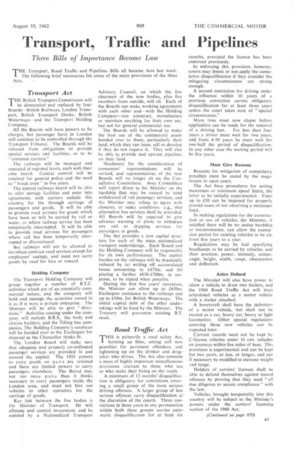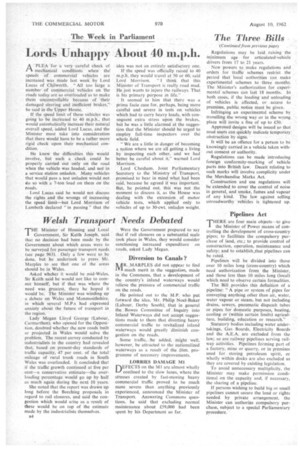Transport, Traffic and Pipelines
Page 37

Page 38

If you've noticed an error in this article please click here to report it so we can fix it.
Three Bills of Importance Become Law
HE Transport, Road Traffic and Pipelines Bills all became Acts last week. 1 The following brief summaries list some of the main provisions of the three
Acts.
Transport Act
THE British Transport Commission will be dismantled and replaced by four Boards—British Railways, London Transport, British Transport Docks, British Waterways—and the Transport Holding Company.
All the Boards will have powers to fix charges, but passenger fares in London will continue to be controlled through the Transport Tribunal. The Boards will be released from obligations to provide special services and facilities, or to be "common carriers."
The railways will be managed and operated at regional levels, each with their own board. Central control will be retained for general policy and the need to "break even" in five years.
, The central railways board will be able to offer storage facilities and enter into agreements with carriers outside this country for the through carriage of passengers and goods. It will be able to provide road services for goods which have been or will be carried by rail or water, or where railway service has been temporarily interrupted. It will he able to provide road services for passengers where rail has been temporarily interrupted or discontinued.
But railways will not be allowed to introduce contract road services except for employees' outings, and must not carry goods by road for hire or reward.
Holding Company The Transport Holding Company will group together a number of B.T.C. :activities which are of an essentially commercial nature, and the company will hold and manage the securities vested in it as if it were a private enterprise. The Minister will be able to give "directions." Activities coming under the company will include B.R.S., the body and chassis builders, and the Tilling bus companies. The Holding Company's surpluses will be handed over to the Exchequer for disposal as the Chancellor thinks fit.
The London Board will make sure that adequate and properly co-ordinated passenger services are provided in and around the capital. The 1933 powers to carry goods on p.s.v.s are retained and there are limited powers to carry passengers elsewhere. The Board may not run more p.s.v.s than it thinks necessary to carry passengers inside the London area, and must not hire out vehicles to other operators for the carriage of goods.
Key link between the five bodies is the Minister of Transport. He will allocate and control investment, and be assisted by a Nationalized Transport Advisory Council, on which the five chairmen of the new bodies, plus five members from outside, will sit. Each of the Boards can make working agreements with each other and—with the Holding Company—can construct, manufacture or maintain anything for their own usc, but not for general commercial use.
The Boards will be allowed to make the best use of the commercial assets handed over to them, particularly their land, which they can lease, sell or develop if they do not require it. They will also be able to provide and operate pipelines on their land.
Machinery for the consideration of consumers' representations will be revised, and representatives of the new Boards will no longer sit on the Consultative Committees. Area Committees will report direct to the Minister on the hardship that may be caused by total withdrawal of rail passenger services; and the Minister may refuse to agree with closures, or make conditions -e.g., that alternative bus services shall be provided. All Boards will_ be required to give advance warning of plans to withdraw any rail or shipping services for passengers or goods.
The Act provides a new capital structure for each of the main nationalized transport undertakings. Each Board and the Holding Company will be responsible for its own performance. The capital burden on the railways will be drastically reduced by (a) writing off accumulated losses amounting to £475m. and (b) placing a further £650-£700m, in suspense, to be repaid when possible.
During the first five years! operation. the Minister can allow up to £450m. Exchequer assistance to the railways and up to £10m. for British Waterways. The initial capital debt of the other undertakings will be fixed by the Minister. The Treasury will guarantee existing B.T. stock.
Road Traffic Act
THIS is primarily a road safety Act. .1 hoisting up fines, setting stiff new penalties for persistent offenders, and tightening up on the drinker and drugtaker who drives, The Act also contains a mass of highly important miscellaneous provisions, relevant to those who use or who make their living on the roads.
A minimum of 12 months' disqualification is obligatory for convictions covering a small group of the most serious driving offences. A larger group of less serious offences carry disqualification at the discretion of the courts. Three convictions in three years in any permutation within both these groups carries automatic disqualification for at least six months, provided the licence has been endorsed previously.
In enforcing this provision, however, courts may lessen or not apply the cumulative disqualifiCation if they consider the mitigating circumstances are strong enough.
A second conviction for driving under the influence within 10 years of a previous conviction carries obligatory disqualification for at least three years unless the court takes note of " special circumstances."
More time must now elapse before application can be made for the removal of a driving ban. For less than four years a•driver must wait for two years, and from 4-10 years he must wait for one-half the period of disqualification. In any other case the waiting period will be five years.
Must Give Reasons Reasons for mitigation of compulsory penalties must be stated by the magistrates in open court.
The Act fixes procedures for setting maximum or minimum speed limits, the latter to be initially experimental. Fines up to £50 can be imposed for properly proved eases of not observing a minimum limit.
In making regulations for the construction or use of vehicles, the Minister, if satisfied there will be no undue hardship or inconvenience, can allow the exemption period for existing vehicles to be cut from five years to a year.
Regulations may be laid specifying headlamps to be carried by vehicles, and their position, power, intensity, colour, angle, height, width, range, obscuration and deflection.
Arties Defined The Minister will also have power to allow a vehicle to draw two trailers, and the 1960 Road Traffic Act will treat articulated vehicles as a motor vehicle with a trailer attached.
A hovercraft shall have the definition of a motor vehicle, but shall not be treated as a car, heavy car, heavy or light locomotive. Other special regulations covering these new vehicles can be expected later.
Current records need not be kept by C-licence vehicles under 16 cwt. unladen on journeys within five miles of base. This provision is experimental and can be kept for two years, or less, or longer, and can if necessary be modified to increase weight and range.
Holders of carriers' licences shall be able to defend themselves against record offences by proving that they used "all du c diligence to secure compliance" with the law.
Vehicles brought temporarily into this country will be subject to the Minister's powers under the carriers' licensing section of the 1960 Act. Regulations may be laid raising the minimum age for articulated-vehicle drivers from 17 to 21 years.
New powers to make regulations and orders for traffic schemes restrict the period that local authorities can make experimental schemes to three months. The Minister's authorization for experimental schemes can last 18 months. In both cases, if the loading and unloading of vehicles is affected, or access to premises, public. notice must be given.
Infringing an experimental scheme by travelling the wrong way or in the wrong place will invite a fine of up to £50.
Approved designs will be issued so that road users can quickly indicate temporary.
obstruction by signs. .
It will be an offence for a person to be knowingly carried in a vehicle taken without consent or authority.
Regulations can be made introducing foreign conformity-marking of vehicle parts into British law. Deceit relating to such marks will involve complicity under the Merchandise Marks Act.
Construction and use regulations will be extended to cover the control of noise in general, and smoke, fumes and vapour of any kind. The law against selling unroadworthy vehicles is tightened up.
















































































































